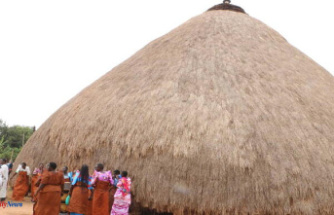While the price of firewood increases, the price of lumber decreases. The timber industry in Hesse is complaining about growing uncertainties and is demanding fewer legal hurdles.
Kassel/Friedrichsdorf (dpa/lhe) - The demand is huge and the prices for firewood are rising rapidly. For sawn timber, on the other hand, they fall again. "The wood markets have developed turbulently up and down in the past two years. We have rarely experienced such volatile price and quantity developments and sales directions," says Christian Raupach, Managing Director of the Hessian Forest Owners' Association.
While the construction boom in the times of Corona caused a sharp rise in the price of sawn timber, Russia's war against Ukraine caused a strong setback again. "Energy prices have risen drastically. That has thrown the wood markets completely upside down again," explains Raupach.
The construction industry is struggling with inflation and supply bottlenecks. "The increased raw material prices have made building so expensive that builders are withdrawing existing orders or no new orders are coming," he explains. The uncertainty is very great. In the fourth quarter, therefore, the order situation at the forestry companies collapsed. "The price, which was top notch in the summer, is now clearly falling again."
At the same time, the demand for firewood is increasing drastically due to rising energy prices. "The prices have shot through the roof," says Raupach. The price for beech firewood, for example, is higher than that for beech industrial wood. "Beech industrial wood, which normally goes to the pulp industry, actually doesn't exist anymore. It only goes to the firewood market." Split firewood from dealers or hardware stores currently costs around 400 euros per cubic metre. "A year ago, home delivery was still between 90 and 110 euros."
Demand is flattening out again at the moment. "But since next winter is supposed to be even more difficult in terms of gas supply, we expect that the demand for firewood will increase again next summer."
The state authority Hessen Forst also reports an increase in the price of firewood. The prices for firewood made from hardwood and softwood have risen between 70 and 100 percent, says spokeswoman Michelle Sundermann. Hardwood such as beech and oak have become 30 to 50 percent more expensive than in the previous year. For softwood, prices are largely stable.
"Overall, the wood prices have developed very positively. However, the proceeds are also necessary to invest in reforestation and to make the forests fit for the climate crisis," explains Sundermann. The sustainable raw material wood thus has its deserved value again.
According to Sundermann, the state authority expects prices to remain stable or rise slightly in the coming year. That depends on many factors, including energy costs, wage increases, building interest rates and the construction industry, as well as economic development in Germany and worldwide. The importance of sustainable building with wood, the decommissioning of forest areas and the associated shortage of wood are also influencing factors.
The Hessian Forest Owners Association views the development with concern. The wood market is completely uncertain and unpredictable, says Raupach. "It doesn't make sense to keep an eye on the firewood market in the long run. Because of course we want to supply our sawmill and industrial customers on a permanent basis. We need pulp production, we need a furniture industry, we need a hardwood and softwood sawing industry for the construction industry."
Well-founded forecasts for the sawmill and timber industry are difficult to make against the background of the unclear economic development in Germany and other countries at this point in time, the German Sawmill and Timber Industry Association also reports. "In view of the current economic situation and an expected recession in the coming year, it is the task of politicians to create strengthening instruments and reliable framework conditions," says Managing Director Julia Möbus.
The energy price brakes are important measures that would only help energy-intensive companies to a limited extent. "Timber construction will play a key role in the transformation of the building sector over the next few years. Politicians are called upon to promote the use of domestic raw materials from our forests and not to restrict them, and to remove legal hurdles for timber construction."
Raupach also advocates this. The so-called Renewable Energy Directive of the European Parliament stipulates that wood will no longer be classified as a renewable energy source from 2030. "It can only be a mistake," says Raupach. Wood is CO2-neutral and always significantly better for the climate than gas or coal. "In addition, wood is one of the few permanently and regionally available raw materials in Germany. It makes absolutely no sense to legally restrict this use of raw materials in any way."
According to a decree by the Hessian Ministry of the Environment, no beeches older than 100 years should be felled in special conservation areas of the state forest. "That further tightens the market." According to Raupach, the best climate protection is the sustainable use of wood.












